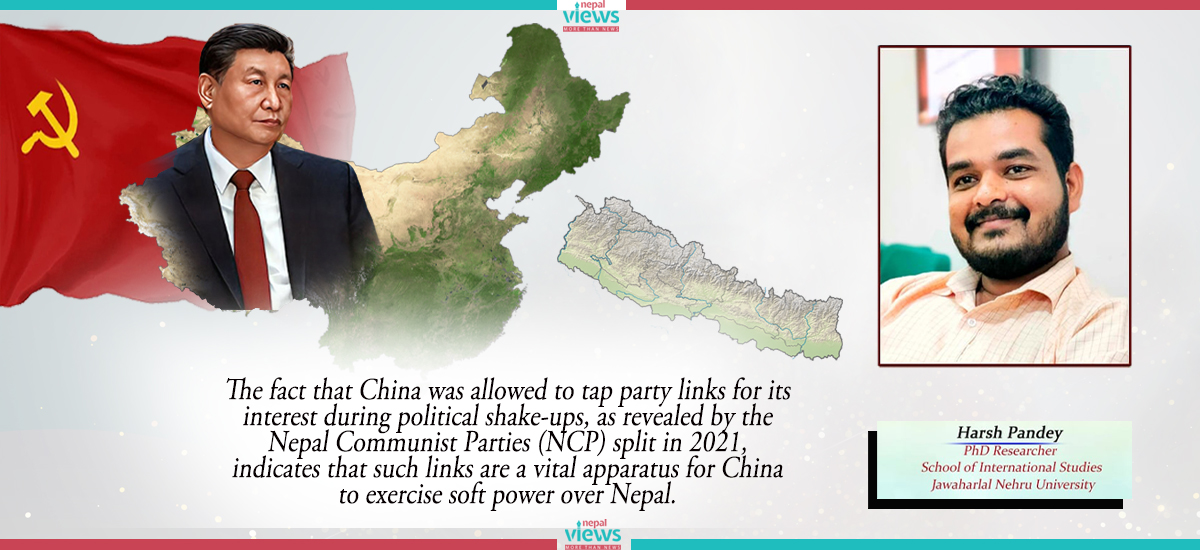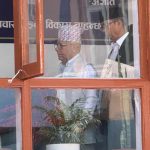Kathmandu: The Communist Party of China (CPC) has tried to maintain a close relationship with all other communist organizations worldwide.
Once one of the strongest ideological movements in the world, the aura of Communism slowly faded after the end of the Cold War. Nevertheless, the communist parties around the globe try to remain connected. The Communist Party of China has used its power developed over the years through China’s economic development to create a robust Party-to-Party relationship with different communist parties worldwide.
Other than ideological affinities, the party-to-party connection serves a strategic purpose for China to wield its influence in that country. The communist parties of Nepal and China also share a close relationship, where the party officials of both countries visit and exchange ideas regularly.
In the recent turn of events, the CPC handed over relief aid to the political parties of Nepal, creating a considerable stir. Unlike China, Nepal is a multiparty democracy where the state is entitled to pursue foreign relations, and the use of aid comes under its purview.
Nevertheless, it is high time to assess the party-to-party relationship between the CPC and other Communist Parties of Nepal. The relations between the CPC and the Nepalese Communist parties have accelerated in recent years, particularly since the rise of President Xi Jinping.
This article explores the historical antecedents of Sino-Nepalese Communist Party relations, their development under Xi Jinping, and whether such party-to-party diplomacy enabled China to influence Nepal’s domestic and international politics.
The Early Stages of Sino-Nepal Communist Relations
Formally established diplomatic relations between China and Nepal existed only from 1955. However, the party-to-party contact between the CPN and CPC can be traced much before that. In the early stages, it was ideologically bound, for it drew strength from this very ideological commitment to communism as a common basis of interaction between the two parties. It was much after the establishment of democracy that party-to-party relations started to formalize as a diplomatic tool.
For most of the mid-20th century, relations between China and Nepal were state-to-state, without any meaningful contact between the CPC and Nepal’s Communist parties. The scenario gradually began to change in the early 1980s, when Nepal delegations led by CPN-UML leader C.P. Mainali visited China through the invitation of the ID-CPC. During the following decades, several high-ranking Nepali Communist Party delegations in China testified to increased exchanges between the parties. However, political instability in Nepal and strong diplomatic ties with India restricted the scope of the close exchanges during the first years of this relationship with China.
Xi Jinping Era
In the past decade, mainly since Xi Jinping assumed office, Chinese foreign policy has been more aggressive, and party-to-party diplomacy has evolved to become one of the core pillars of China’s global policy. It pursued relationships with political parties worldwide having communist or left-leaning ideologies. Such an approach was further strengthened by the BRI initiative initiated by Xi Jinping.

Xi’s visit to Nepal in 2019 further laid a robust plan for deepening party relations between China and Nepal. With his remarks on long-term cooperation, he strategically conveyed that this plan would cement Chinese influence within Nepal’s political structure. This was evident in the CPC’s strong actions toward unifying the splintered Nepali Communist movement.
After the establishment of the NCP (a party formed by making two main communist factions of Nepal, CPN (UML) and CPN (Maoist Centre) as a single party), China expected that such a union would lead to the formation of an enduring government that would promote stronger economic ties with China for a long time. On its part, China offered institutionalized political and financial aid, training sessions, and field visits and appraised the communist party cadres of Nepal about “Xi Jinping Thought.”
Indian and Chinese Aid to Nepal: Understanding ‘THE’ Critical Dynamics
However, this internal factionalism of Nepal’s Communist parties proved to be a significant challenge for China. Where it considered the NCP to be one stable organization, easy to manage, the party had to split because of the Supreme Court of Nepal’s order again in 2021, causing a shake-up in the political terrain of Nepal and making it even more challenging for China to uphold its influence. Yet, China’s willingness to intervene diplomatically after the split, as represented by the visit of ID-CPC Vice-Minister Guo Yezhou to Nepal, speaks volumes about the importance attached by Beijing to party-to-party diplomacy to manage its relations abroad.
How Does it Impact Nepal-China Relations?
A fundamental question raised by China’s party-to-party diplomacy is whether it effectively allows China to influence the internal politics of other nations, such as Nepal. Concerning Nepal, the answer is both affirmative and negative. The party-to-party links created by China have, no doubt, strengthened its influence over specific political groupings in Nepal. Their ideological training sessions, seminars, and regular visits at the high level have enabled China to establish close ties with Nepali Communist officials, mainly in the NCP and CPN-UML. This has allowed China to derive excellent political dividends, such as large infrastructure contracts awarded to Chinese companies.
For instance, the fact that China was allowed to tap party links for its interest during political shake-ups, as revealed by the Nepal Communist Parties (NCP) split in 2021, indicates that such links are a vital apparatus for China to exercise soft power over Nepal. The level of influence China wields over the politico-discursive arena of Nepal is relatively high, and inter-party interactions in China have spurred the thought that Beijing is a reliable partner for Nepal’s development.
Nevertheless, Nepal is a multi-party democracy with ever-changing political entrepreneurs, unlike China. Its Communist political actors are also interested in democratic political contestations. The influence wielded by China on these parties sometimes works in its favor.
However, in real terms, Nepal does not get anything substantial from these efforts, and neither do these parties. China’s future influence in Nepal will depend on its ability to adapt to changes in the political landscape and its willingness to keep up with rising concerns over Chinese-financed projects. While state-to-state diplomacy may succeed in building alliances, it must be supported by state-level engagement and development priorities that complement Nepal’s priorities.
Harsh Pandey is a Doctoral Candidate at the School of International Studies, Jawaharlal Nehru University, New Delhi. He is also a life member of the International Centre for Peace Studies, New Delhi.












